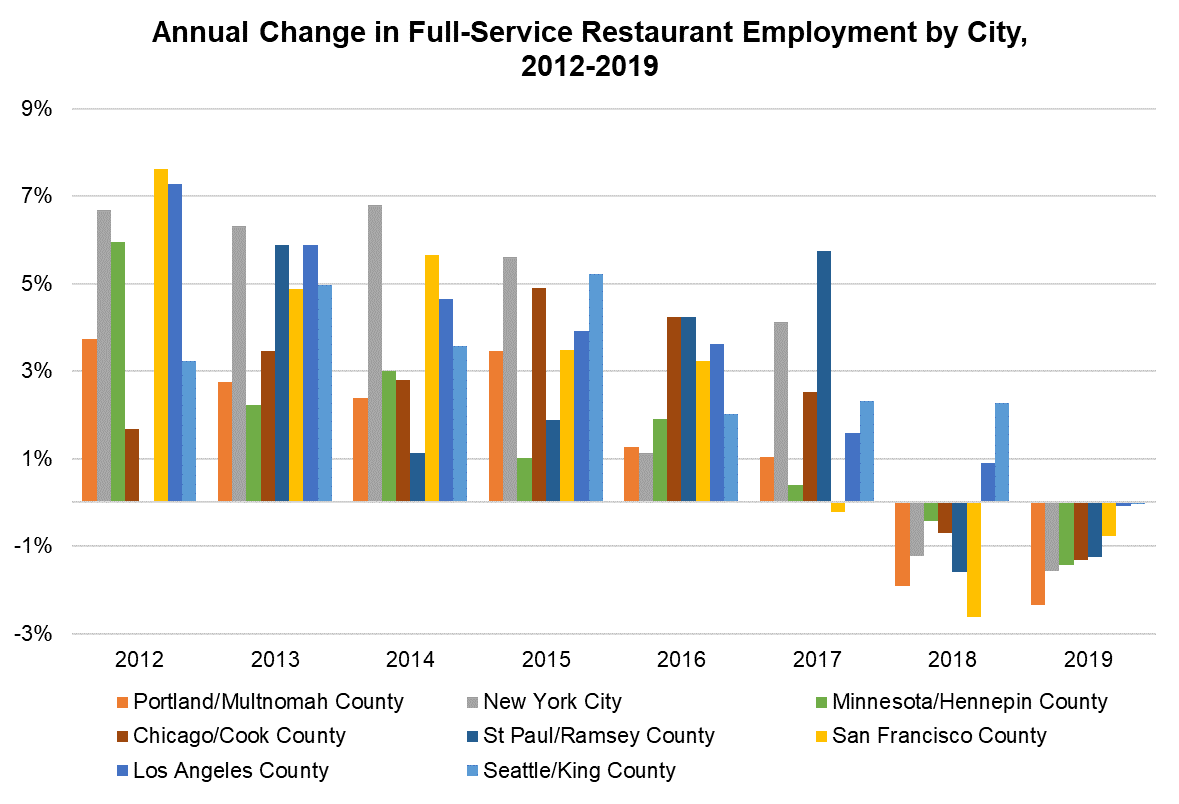The latest casualty of skyrocketing wage mandates is Deva Cafe in Modesto, CA. The popular neighborhood restaurant has been open for three decades, and owner Heather Elkins has announced it will be closing its doors permanently due to rising inflation and the upcoming minimum wage hike. She tried raising menu prices as a way to ameliorate the costs mounting for her business, but eventually had to stop for fear of losing her customers.
Deva Cafe is not alone – many restaurants have closed in the last year as a result of minimum wage pressures combined with other economic factors. Even though the pandemic wreaked initial havoc on restaurant survival during shutdowns, minimum wages are extending the pain of lingering pandemic pressures.
- Restaurants in Syracuse, NY this month experienced numerous closures, citing rising costs including those triggered by upcoming minimum wage hikes.
- Earlier this summer, Illinois bakery and cafe Baking Grounds North closed due to rising costs. In a Facebook post announcing the closure, operators noted in three years of being open, the state minimum wage rose by nearly 50 percent, making keeping their business open “a dream that is now impossible.”
- As New Jersey has raised its minimum wage annually over the last several years, Simple Greek restaurant in Hamilton Township, NJ announced it would close due to three years of minimum wage increases and being unable to raise prices enough to accommodate the constant hikes.
Research in high-wage markets such as San Francisco finds that raising minimum and tipped minimum wages directly affects restaurant shutdown. In a study by Harvard Business School researchers, a $1 increase in the minimum wage correlated with a 14 percent increase in the likelihood a median-rated restaurant would close.
Unrelenting wage hike schedules don’t just affect restaurant operators, but their employees feel the pain too.
- In Connecticut, where the state minimum wage increased to $14 per hour this summer after years of scheduled hikes, restaurants reported having to increase prices to stay afloat as labor costs rose 35 percent across the state, and voiced concerns that these hikes would further hurt business and force them to close. The owner of Lulu’s Ice Cream Cafe in Hartford, CT reported the state’s yearly hikes have forced her to reduce her staff down to a single part-time employee, for whom she may be forced to further reduce scheduled hours just to keep her on the payroll.
- A recent study of the impact of Minneapolis and St. Paul, MN annual wage hikes showed the cities’ restaurant industries shed thousands of jobs due to several years of back-to-back wage hikes based on inflation.
In fact, high wage markets across the country have all experienced significant restaurant job loss, especially in cities that don’t allow restaurants to take a tip credit for tipped restaurant employees. Compared to the national average growth rate of full-service restaurant employment, which has slowed but remained positive, cities with high wage mandates such as San Francisco, Los Angeles, Portland, OR; New York City, NY; Minneapolis, MN and St. Paul MN have actually lost thousands of restaurant jobs amid annual wage hikes – even before the impacts of the pandemic in 2020.

Between 2017 and 2019, New York City lost almost 5,000 full-service restaurant jobs as minimum wages increased every year. Chicago and Cook County experienced almost 2,000 full-service restaurant jobs lost as wages increased annually by inflation. San Francisco lost roughly 1,300 jobs – as restaurant operators called the city’s restaurant closures a “death march” due to the city’s overbearing business regulations.
As minimum wage debates continue on the ballot and among candidates this election season, voters and elected officials should heed the real consequences of compounding existing economic pressures with more minimum wage obstacles.
